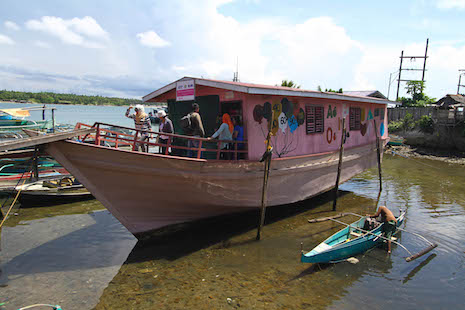Floating schools bring hope to sea gypsies in the Philippines
Standing in a semi-circle, a group of 30 children sing a song as their classroom sways with the waves.
Nov 21, 2014

PHILIPPINES: Standing in a semi-circle, a group of 30 children sing a song as their classroom sways with the waves.
"It's fun here," said nine-year old Arabella Gihay.
"It's very near our house, and we are more comfortable here at sea," said the young Bajau girl.
The Bajau, more commonly known as "sea gypsies", number from 70,000 to 100,000 and often live their entire lives in the waters of Tawi-Tawi, Sulu, Basilan, and Zamboanga provinces in the southern Philippines.
But while the arrangement is one that has changed little in generations, the lifestyle has made poverty common and simple services like schooling and healthcare rare.
Arabella and her eight siblings, like many in her village, live in a cramped stilt house and infrequently attended school in the town center. To make ends meet, the children instead helped their parents to fish and sell their catch at the market.
"My parents did not really have a plan to send us to school because we do not have money," she said.
With the schools coming directly to families, however, students are more likely to attend.
Arithmetic was barely a part of Arabella's life until the "floating school" docked a few meters from her house. Today, she and her brother, who attends the same class, can now count.
In June, the Department of Education delivered a fleet of eight floating schools to the area to address gaps in education in the remote region.
Nazrul Islam, the project's coordinator in the country, said the floating school model was adopted from the "boat school" project in Bangladesh.
There, Shidhulai Swanirvar Sangstha, a non-profit organization reaches out to provide education to thousands of children missing out on lessons because of flooding which inundates their regular schools during the monsoon season each year.
Islam said this model is suited for the Bajau who are "mostly reluctant to mingle with people belonging to other more dominant Moro tribes".
In instituting “innovative and community-driven learning methods", said Islam, the government can increase school attendance.
Jenilyn Jumdabi, Arabella's teacher, said the floating schools offer a safer and better space for the Bajau children to have access to education.
"Many of them are afraid to go to regular schools because they are discriminated against and bullied," said Jumdabi.
With the floating school, Jumdabi said she implements the native language for songs, games, and lessons. "It's easy for them to understand," she said.
For Arabella, the push for education has already drawn dividends.
"It is my dream to finish my studies," the young girl said. "Then I want to study in a university to become a teacher and help build more schools for Bajau children.”--ucanews.com







Total Comments:0